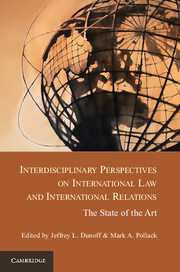 Interdisciplinary Perspectives on International Law and International Relations
Interdisciplinary Perspectives on International Law and International Relations Introducing an Interdisciplinary Dialogue
Published online by Cambridge University Press: 05 January 2013
A casual observer might expect that international lawyers and international relations scholars would share overlapping research interests and scholarly agendas. In fact, for several decades prior to the Second World War, practitioners in both fields pursued common interests in the making, interpretation, and enforcement of international law. As a matter of disciplinary history, however, World War II served as a watershed event, largely discrediting international law among political scientists as “realist” theorists rejected the notion that international law could serve as a meaningful constraint on states’ pursuit of the national interest. Over the next four decades, international relations (IR) and international law (IL) scholarship developed along separate and rarely intersecting tracks. Legal scholars sought to emphasize law's autonomy from politics, and focused on identifying, criticizing, or justifying specific legal rules and decision-making processes. For their part, political scientists seldom referenced international law as such, even when their topics of interest, such as international cooperation and international regimes, overlapped in clear ways with international law.
The mutual neglect among international law and politics began to ebb only with the end of the Cold War and the increased salience of international rules and institutions. In 1989, legal scholar Kenneth Abbott published a manifesto calling for interdisciplinary scholarship on international law and encouraging legal scholars to draw upon recent political science scholarship. Over the next decade, a growing number of legal scholars began to ask new questions about the design and workings of international law, drawing on both theories of international relations and on qualitative and quantitative methods imported from political science. By the early 2000s, political scientists in turn “rediscovered” international law, a development marked most clearly by the publication of a special issue of International Organization, the leading journal in the field, devoted to understanding the causes and consequences of the “legalization” of international politics.
To save this book to your Kindle, first ensure [email protected] is added to your Approved Personal Document E-mail List under your Personal Document Settings on the Manage Your Content and Devices page of your Amazon account. Then enter the ‘name’ part of your Kindle email address below. Find out more about saving to your Kindle.
Note you can select to save to either the @free.kindle.com or @kindle.com variations. ‘@free.kindle.com’ emails are free but can only be saved to your device when it is connected to wi-fi. ‘@kindle.com’ emails can be delivered even when you are not connected to wi-fi, but note that service fees apply.
Find out more about the Kindle Personal Document Service.
To save content items to your account, please confirm that you agree to abide by our usage policies. If this is the first time you use this feature, you will be asked to authorise Cambridge Core to connect with your account. Find out more about saving content to Dropbox.
To save content items to your account, please confirm that you agree to abide by our usage policies. If this is the first time you use this feature, you will be asked to authorise Cambridge Core to connect with your account. Find out more about saving content to Google Drive.